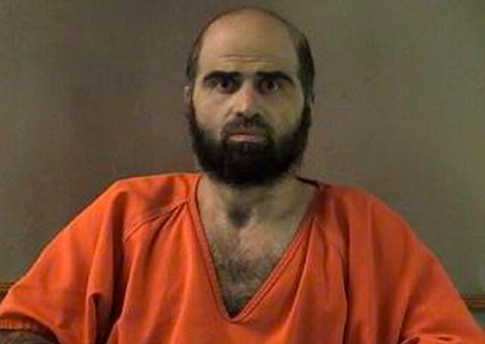By Eric M. Johnson
FORT HOOD, Texas (Reuters) - The U.S. soldier who admitted killing 13 fellow soldiers and wounding 31 others in a shooting rampage at a Texas army base in 2009 told a mental health panel he wished to die while carrying out "jihad" because it would signal God had designated him as a religious martyr.
The New York Times on Tuesday published an account of parts of the panel's January 2011 report on Major Nidal Hasan, a 42-year-old U.S.-born Muslim whose court-martial began at Fort Hood, Texas on August 6. The newspaper also published an image online of the official report. Some pages of the report were released by Hasan's former civilian lawyer, John Galligan, the newspaper said.
The panel, known as a sanity board, was assembled to assess whether former Army psychiatrist Hasan was able to stand trial. It concluded he was fit for trial but the contents of the report have not been heard by the jury of military officers.
Hasan told the court last week that he switched sides in what he called a U.S. war on Islam. He told the jury, "I am the shooter" and he has not contested the testimony of more than 60 witnesses who described the November 5, 2009 shootings, the worst non-combat attack on a U.S. military base.
The court-martial resumed on Tuesday with expert witness testimony about the crime scene. Hasan attends court in a wheelchair after being paralyzed from the waist down in a shootout with military police who ended his rampage.
Hasan could face the death penalty by lethal injection if he is convicted.
"I'm paraplegic and could be in jail for the rest of my life," Hasan told the panel of military mental health experts.
"However, if I died by lethal injection I would still be a martyr," Hasan said.
He also denied having remorse and considered his injuries a "badge of honor," according to the report.
The terse, unapologetic statements help explain tension between Hasan, who is defending himself, and a team of standby lawyers assisting him who have sought to take a lesser role because they say Hasan is actively seeking the death penalty.
The standby lawyers say their code of ethics prevents them from assisting. Hasan has disputed the assertion he is seeking the death penalty for himself, and military judge Colonel Tara Osborn has denied the lawyers' request to reduce their role.
Hasan was "encouraging or working toward the death penalty," one of his lawyers, Lieutenant Colonel Kris Poppe, told Osborn during the court-martial.
The lead military prosecutor has said Hasan at the time of the attack wanted to avoid his impending deployment to Afghanistan and felt a religious duty to kill as many soldiers as possible. Many of the witnesses have said they at first believed the shooting was a training exercise because soldiers are normally prohibited from carrying weapons on base.
A review by a former FBI director found Hasan had exchanged emails with Anwar al-Awlaki, a U.S.-born cleric linked to al Qaeda's Yemen-based wing. Awlaki was killed in a U.S. drone strike.
FBI officials were to testify in the court-martial as early as Tuesday.
The mental health report said Hasan wore earplugs to muffle his semi-automatic handgun blasts and chose areas at the Soldier Readiness Processing Center that had the "greatest density" of uniformed military personnel.
He also told the panel he prayed in the morning at a mosque in nearby Killeen, Texas, on the day of the shootings and destroyed personal identification, which he would not need because he would either be killed or in jail.
Hasan denied that depression or anxiety contributed to his motive.
"I don't think what I did was wrong because it was for the greater cause of helping my Muslim brothers," he told the military panel.
